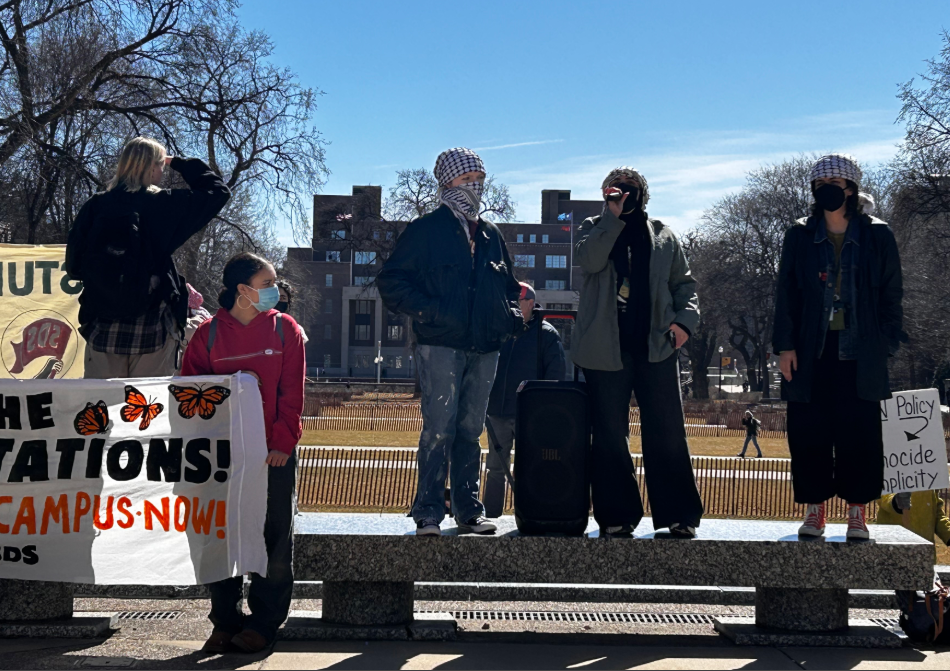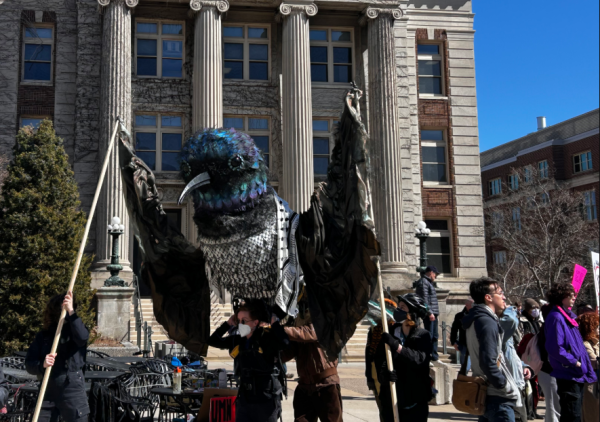
Tyler Church
The groups spoke against the University’s rollbacks under the new Trump administration and lack of divestment from the Israel-Palestine War.
Around a hundred protesters gathered Monday afternoon outside Northrop Auditorium to protest the University of Minnesota’s compliance with recent changes under Republican President Donald Trump’s administration.
Over an hour and a half, nine different representatives united to denounce the University’s administration before ending the protest with a group photo on the stairs of Northrop Auditorium.
The group photo, according to activists, was meant to commemorate the work they did this semester.
Kirubele Adbebe, who was arrested at the Board of Regents meeting on March 14, denounced the administration for not protecting students.
“I got arrested, but that don’t mean nothing to me,” Adbebe said to the crowd. “They’re going to throw whatever they want, investigate me, do whatever they can, because they know the true power is here — with the students.”
According to Students for a Democratic Society member Rowan Lange, the University charged Adbebe with trespassing during his protest at the Board meeting against a controversial policy restricting institutional speech.
“This whole institution, these buildings, these pillars, everything is bought and paid for with our money, our work, our labor,” Adbebe said.
Outside of chanting and demonstrating, protestors chose some unique ways to let their frustrations be known.
Before and during the protest, members of the crowd used chalk to write messages denouncing University President Rebecca Cunningham, Trump and the Israel-Palestine War. These messages covered much of Northrop Mall’s pavement, with some protestors even leaving messages in chalk on the front steps and walls of Northrop Auditorium.
During the protest, a small group operated a puppet of a Palestine sunbird, which symbolizes hope, and walked around the crowd flapping its makeshift wings.

Sima Shakhsari, an associate professor for the Department of Gender, Women and Sexuality Studies and a member of Educators for Justice in Palestine, encouraged staff to speak out and campaign against the wrongdoing that they’ve seen, both on campus and in the wider world.
“I want to encourage my colleagues, who have been silent so far,” Shakhsari said. “If I can speak, so can you. It’s not about bravery, it’s not about being stupid, it’s an ethical responsibility that every one of us has.”
Shakhsari, who has faced criticism and claims of antisemitism for her protests and activism, said she will continue to speak out until she sees change. She said that she worries for her and her colleagues’ futures under the Trump administration as funding cuts at universities begin to increase.
In recent months, the University has come under fire from the Trump administration, which placed the University on a list of 60 universities nationwide that are under investigation for antisemitic discrimination and harassment. The list, which also includes seven other Big Ten universities, states that the University failed to protect Jewish students from hateful acts on campus.
Siham Ibrahim, who spoke on behalf of Students for the Horn of Africa, said in her speech that she believes the University is putting students at risk of oppression and injustice. Trump’s policies, she said, threaten the autonomy and free speech rights of people across the U.S.
“Those who stand weak in the face of injustice, such as President Cunningham and the Board of Regents, they will not prosper,” Ibrahim said. “Not only will they lose the fight in the end, they show us that, in the face of oppression, they will willingly step aside and aid in the oppression of their own students.”
